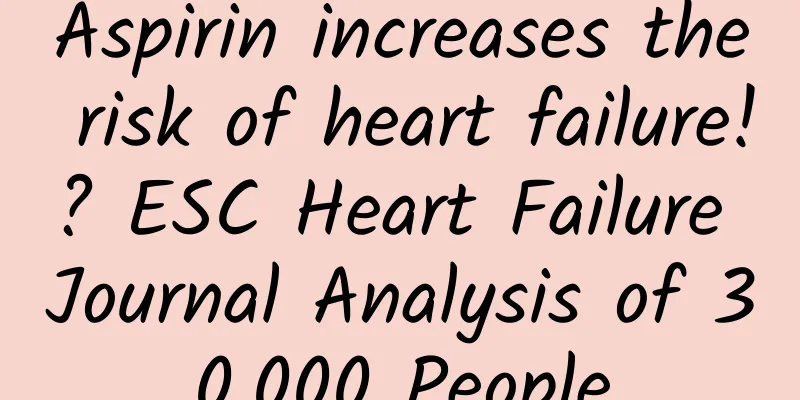Aspirin increases the risk of heart failure!? ESC Heart Failure Journal Analysis of 30,000 People

|
In recent years, the use of aspirin for primary prevention of cardiovascular disease remains controversial. On November 22, a study published in the European Society of Cardiology (ESC) Heart Failure Journal found that in patients with at least one risk factor for heart failure (including smoking, obesity, hypertension, hypercholesterolemia, diabetes, and cardiovascular disease), the use of aspirin actually increased the risk of heart failure. The authors pointed out that the results of this study need to be further verified, but suggest that aspirin and heart failure have a potential association. Once the results of this study are confirmed, people with risk factors for heart failure or those who already have heart failure should use aspirin with caution. The study involved 6 European and American observational studies, involving a total of 30,827 patients aged ≥40 years who were at risk of heart failure but had no heart failure at baseline. Of these patients, 33.9% were women, with an average age of 66.8 years, and 25% were taking aspirin. During a median follow-up of 5.3 years, 1,330 people developed heart failure. After adjusting for factors such as age, sex, body mass index, smoking, drinking, blood pressure, heart rate, cholesterol, creatinine, hypertension, diabetes, cardiovascular disease, renin angiotensin aldosterone system inhibitors, calcium channel blockers, diuretics, beta-blockers, and lipid-lowering drugs, the analysis showed that patients using aspirin had a 26% increased risk of heart failure compared with those not using aspirin. Further propensity score matching analysis also obtained the same results. Among 22,690 patients (73.6%) without cardiovascular disease, those who used aspirin had a 27% increased risk of heart failure. Aspirin use was consistently associated with HF risk across all baseline systolic and diastolic blood pressure levels. The researchers further found that among non-diuretic users, aspirin users had a slightly increased risk of heart failure compared with diuretic users (HR, 1.14 and 1.38, respectively). Similarly, among those not using statins, those who used aspirin had a higher risk of heart failure (vs those who used statins at baseline, HR=1.5 vs 1.19). The researchers pointed out that hypertension is one of the main risk factors for heart failure. People who take diuretics may benefit from the good control of blood pressure by diuretics, while people who do not use diuretics may suffer from renal damage due to aspirin and increase the risk of heart failure. Aspirin interacts with statins and may increase the platelet response to aspirin, thereby further reducing platelet aggregation. Source: China Circulation Magazine |
>>: Special Topic: Obesity - the root of all diseases (4)
Recommend
The difference between hydrotubation and angiography is huge
Hysterosalpingography is mainly formed by X-ray i...
What causes dull pain in the lower left side of the female abdomen?
Women, especially after getting married, will fac...
What are the changes in body temperature before menstruation?
Menstruation is a unique physiological phenomenon...
Why do women have two urethral openings?
As we all know, whether men or women, there is on...
There is no duck in the duck blood for hot pot? 15 types of duck blood were tested, and the results were unexpected!
After testing the authenticity of mutton skewers ...
What to do if you have trouble sleeping during pregnancy
It is said that maternal love is greater than hea...
Will defaulting on property management fees affect the transfer of ownership? What are the standards for charging property management fees?
Many property owners want to know and understand ...
Does anger affect conception?
Before women prepare to conceive, they are of cou...
There is still coffee color after the period ends
During those few days of each month, women will a...
What is the best time to do 4D color Doppler ultrasound?
Four-dimensional color ultrasound is an examinati...
Postpartum weight loss methods
The problem that most of our female compatriots a...
What is the correct way to examine the breast?
As living standards have gradually improved in re...
All children should be screened for conditions that can cause sudden death! American Academy of Pediatrics statement
Each year in the United States, about 2,000 peopl...
Why can I still get pregnant with an IUD?
In the sexual life of men and women, many contrac...
Symptoms of early pregnancy discharge
Women who are pregnant, whether in the early, mid...




![[Health Lecture] How do kidney patients on dialysis spend the winter?](/upload/images/67f09d2ae127f.webp)




